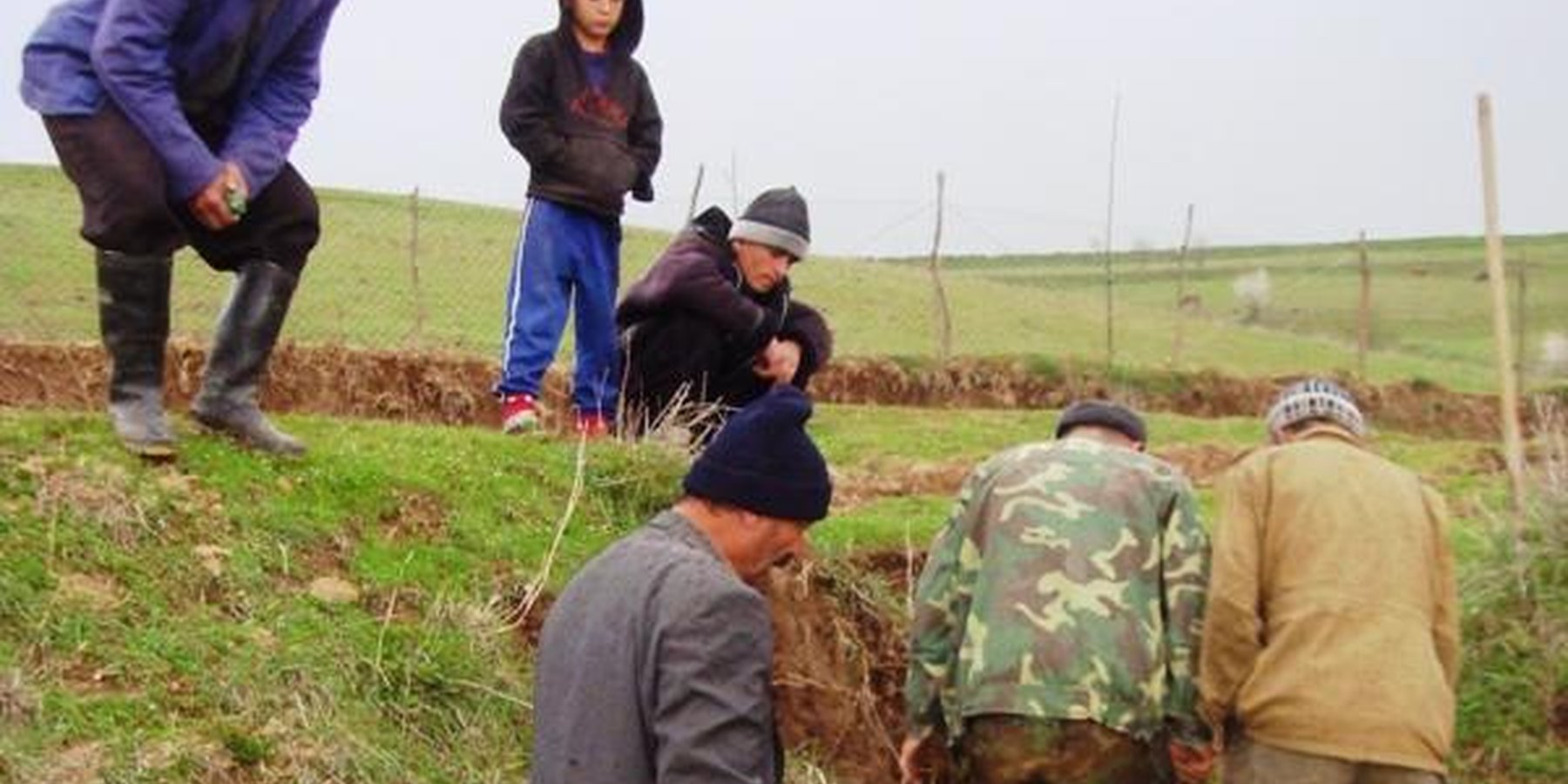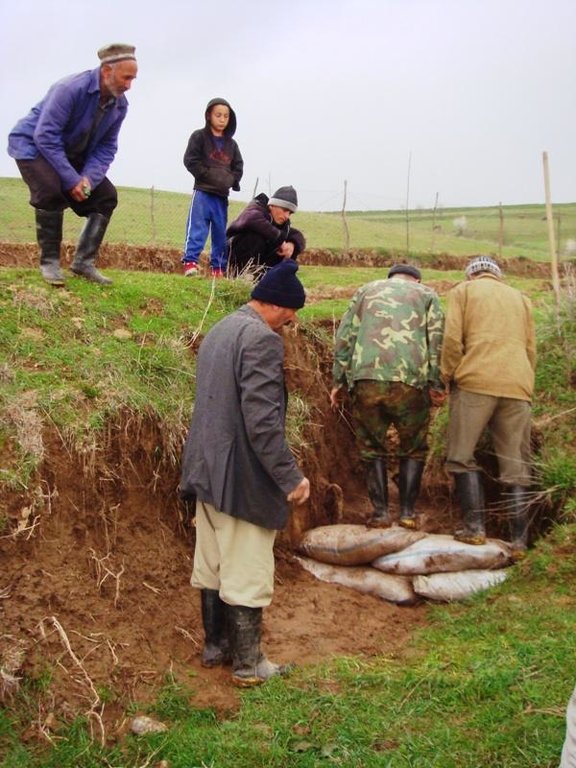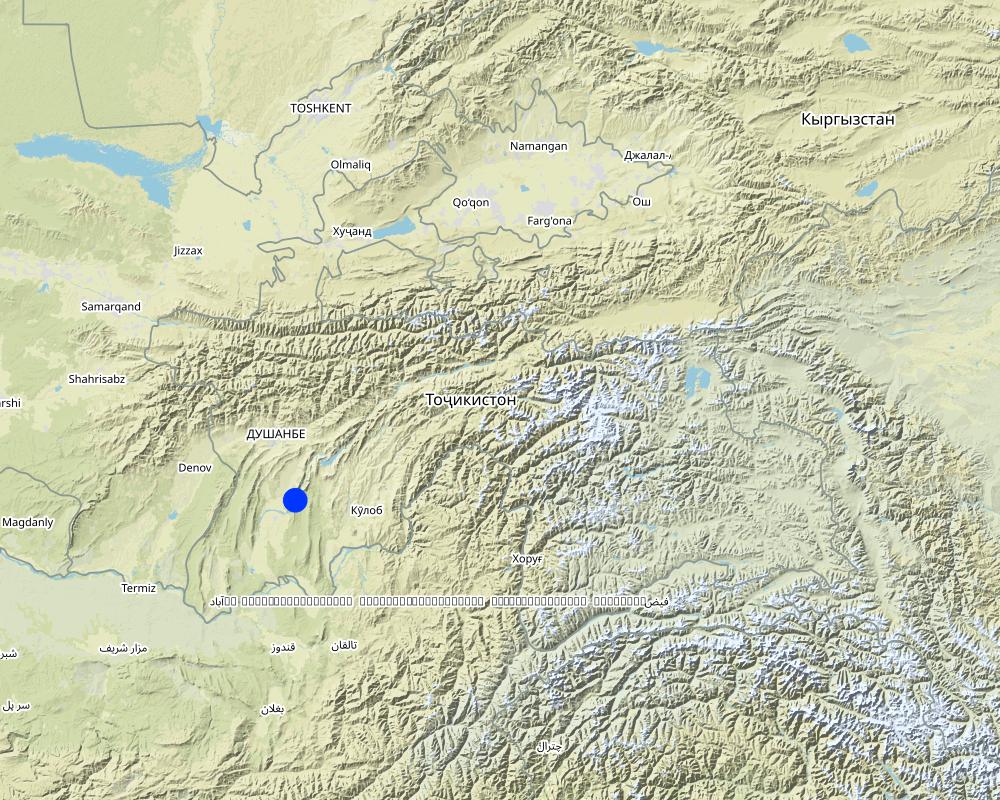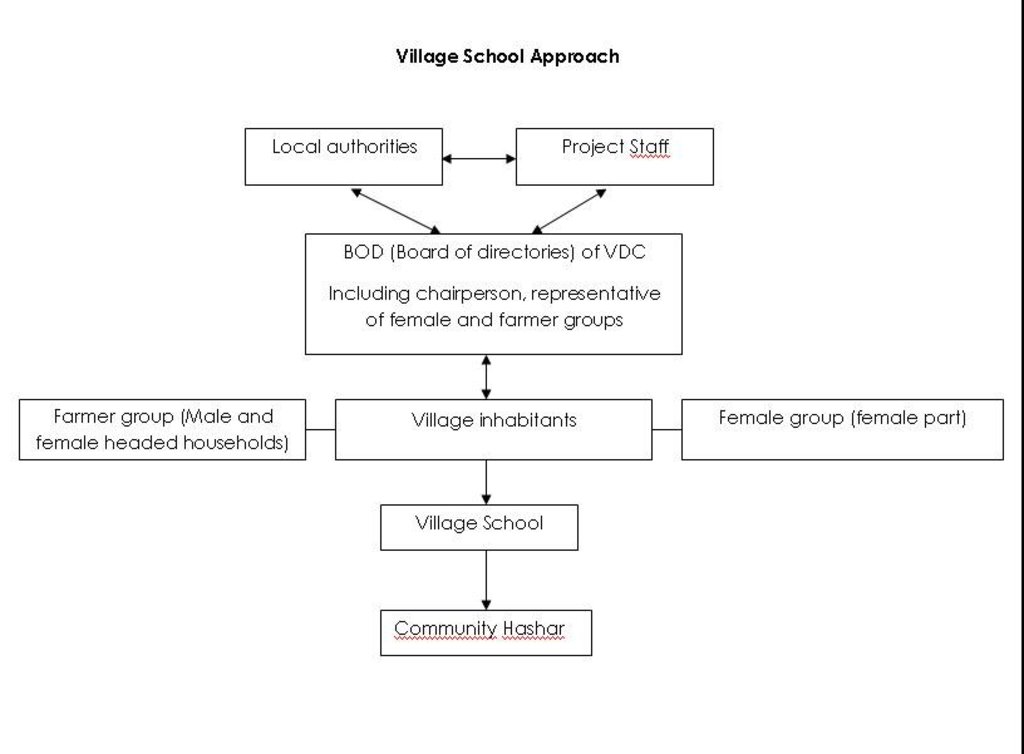Village school participation and involvement [ทาจิกิสถาน]
- ผู้สร้างสรรค์:
- การอัพเดท:
- ผู้รวบรวม: Daler Domullojonov
- ผู้เรียบเรียง: –
- ผู้ตรวจสอบ: David Streiff, Alexandra Gavilano, Joana Eichenberger
Чалб ва иштироки мактаби деха
approaches_2572 - ทาจิกิสถาน
ดูส่วนย่อย
ขยายทั้งหมด ย่อทั้งหมด1. ข้อมูลทั่วไป
1.2 รายละเอียดที่ติดต่อได้ของผู้รวบรวมและองค์กรที่เกี่ยวข้องในการประเมินและการจัดเตรียมทำเอกสารของแนวทาง
ชื่อของโครงการซึ่งอำนวยความสะดวกในการทำเอกสารหรือการประเมินแนวทาง (ถ้าเกี่ยวข้อง)
Pilot Program for Climate Resilience, Tajikistan (WB / PPCR)ชื่อของโครงการซึ่งอำนวยความสะดวกในการทำเอกสารหรือการประเมินแนวทาง (ถ้าเกี่ยวข้อง)
Deutsche Welthungerhilfe e. V. (Welthungerhilfe) - ทาจิกิสถาน1.3 เงื่อนไขที่เกี่ยวข้องกับการใช้ข้อมูลที่ได้บันทึกไว้ผ่านทาง WOCAT
ผู้รวบรวมและวิทยากรหลักยอมรับเงื่อนไขเกี่ยวกับการใช้ข้อมูลที่ถูกบันทึกผ่านทาง WOCAT:
ใช่
2. คำอธิบายของแนวทาง SLM
2.1 การอธิบายแบบสั้น ๆ ของแนวทาง
A competitive tendering process for project grant money to implement identified SLM practices within a community, and on completion of the implementation activities the village school will be assigned ownership and responsibility for the maintenance and sustainability.
2.2 การอธิบายอย่างละเอียดของแนวทาง
การอธิบายอย่างละเอียดของแนวทาง:
Aims / objectives: The objective of the approach is to find a mechanism by which you can involve large sections of the community, allocate land for the communities benefit, provide a mechanism for long term maintenance, and establish a demonstration area for cross site visits and educational training.
Methods: Several methods were employed to implement the approach, these included community and local government workshops, seminars on proposal writing followed by subsequent proposal development in conjunction with local experts and community mobilization. The project staff used the approach to train active community members on suitable land management practices that would benefit identified degraded lands and develop sustainable competitive proposals to be reviewed by a selection panel. The community was encouraged to provide substantial input into the funding of their proposed project if they wanted to be successful. A predetermined condition was set on awarded grants that the degraded land had to be officially allocated to the school for a twenty year period.
Stages of implementation: The INGO Welthungerhilfe announced a competition amongst the local communities in one region to submit project proposals for addressing community environmental problems. The local government were involved from the outset, were encouraged to help suggest communities that should compete. The communities were provided with workshops on how to develop sustainable land management proposals with support from local agronomists. The proposals had to outline the commitment of the community, the area of land to be re-established and how, and finally the level of community contribution towards the project. The terms of the competition dictated that the area of rejuvenated land would be officially signed over to the school for a period of twenty year and the school community would thereby be responsible for the maintenance and upkeep of the land and entitled to invest any profits back into the school, hence indirectly supporting many families in the community. The projects were selected based on a predetermined criterion and the winning projects received part funding in the form of fuel, machinery, fencing etc upto 50% of the final costs. The people were mobilised to implement the project though a community day of action know as a ‘Hashar’ and on completion the school assumed responsibility for the plot of land.
Role of stakeholders: Although the approach is project driven it required buy in from the local authorities, and the heads of collective dehkan farms who dedicate land use right to village schools, however it was the school community that had to be the real driving force to see the proposal developed into a tangible outcome.
2.3 รูปภาพของแนวทาง
2.5 ประเทศ ภูมิภาค หรือสถานที่ตั้งที่ได้นำแนวทางไปใช้
ประเทศ:
ทาจิกิสถาน
ภูมิภาค/รัฐ/จังหวัด: :
Tajikistan / Khatlon
ข้อมูลเฉพาะเพิ่มเติมของสถานที่ตั้ง:
Khovaling / Dorobi
Map
×2.6 วันที่เริ่มต้นและสิ้นสุดของแนวทาง
ระบุปีที่เริ่ม:
2
การสิ้นสุดลง (ถ้าแนวทางไม่ได้ใช้อีกต่อไป):
2009
2.7 ประเภทของแนวทาง
- ใช้โครงงานหรือแผนงานเป็นฐาน
2.8 เป้าหมายหรือวัตถุประสงค์หลักของแนวทาง
The Approach focused mainly on SLM with other activities (Community initiated SWC activities realised with involvement of village school, holistic approach, )
environmental restoration by community involvement. to prevent soil erosion, gulley expansion and land degradation; to convert barren land to agroforestry system. to create capacity of villagers and young generation to protect environment and effective use of locally available natural resources.
The SLM Approach addressed the following problems: Poor land management practices compounded by a lack of knowledge and funds that have resulted in continued land degradation and loss of fertility.
2.9 เงื่อนไขที่เอื้ออำนวยหรือเป็นอุปสรรคต่อการนำเทคโนโลยีภายใต้แนวทางนี้ไปปฏิบัติใช้
การมีไว้ให้หรือการเข้าถึงแหล่งการเงินและบริการ
- เป็นอุปสรรค
Limited availability of funds
Treatment through the SLM Approach: Project provided support funding to match contributions provided by the community.
กรอบแนวทางในการดำเนินการด้านกฎหมาย (การถือครองที่ดิน สิทธิในการใช้ที่ดินและน้ำ)
- เอื้ออำนวย
The existing land ownership, land use rights / water rights greatly helped the approach implementation: The state were very supportive of the allocation of land to the schools.
- เป็นอุปสรรค
There were no formal documented land user rights on the land selected for the implementation of technologies.
Treatment through the SLM Approach: Before the implementation started the plot of land was officially assigned to the school for a period of 20 years.
ความรู้เกี่ยวกับ SLM การเข้าถึงการสนับสนุนด้านเทคนิค
- เป็นอุปสรรค
There is a lack of technical knowledge within the community.
Treatment through the SLM Approach: A series of cross visits and practical trainings were organised by the project to neighboring communities.
ปริมาณงานที่ทำได้ กำลังคนที่มีให้
- เป็นอุปสรรค
There is extensive work required in the successful implementation and maintenance of the chosen technologies.
Treatment through the SLM Approach: The plot was divided into 3 parts to assign specific responsibilities.
3. การมีส่วนร่วมและบทบาทของผู้มีส่วนได้ส่วนเสียที่เกี่ยวข้อง
3.1 ผู้มีส่วนได้ส่วนเสียที่เกี่ยวข้องในแนวทางนี้และบทบาท
- ผู้ใช้ที่ดินระดับท้องถิ่นหรือชุมชนระดับท้องถิ่น
Community members and farmers
Mainly heavy activities like organic fertilizers carry, ploughing and planting was carried by males.
Women supported with feeding of workers.
All interested community members were involved in all stages of activities implementation and final beneficiary of action is school.
- ผู้เชี่ยวชาญ SLM หรือที่ปรึกษาการเกษตร
The approach was designed by international experts with input from national specialists
Project technical staff, advisor
- ครู เด็กนักเรียน หรือนักศึกษา
School teacher
- องค์กรพัฒนาเอกชน
WHH project staff
- รัฐบาลระดับท้องถิ่น
Head of jamoat (sub district), and village head
ถ้ามีผู้มีส่วนได้ส่วนเสียหลายคนที่เกี่ยวข้องให้ระบุหน่วยงานตัวแทน:
local authorities and project staff
3.2 การเกี่ยวข้องของผู้ใช้ที่ดินระดับท้องถิ่นหรือชุมชนระดับท้องถิ่นในช่วงต่างๆของแนวทาง
| ความเกี่ยวข้องของผู้ใช้ที่ดินระดับท้องถิ่นหรือชุมชนระดับท้องถิ่น | ระบุผู้ที่มีส่วนเกี่ยวข้องและอธิบายกิจกรรม | |
|---|---|---|
| การริเริ่มหรือการจูงใจ | ระดมกำลังด้วยตนเอง | community members leading by teacher presented project proposal to receive support of project realization to WHH project |
| การวางแผน | ปฏิสัมพันธ์ | teachers together with project staff look through and updated plan |
| การดำเนินการ | ปฏิสัมพันธ์ | in the beginning it was really good and active labor and in-kind contribution of activity, once additionally in cash contribution was required teacher continued alone |
| การติดตามตรวจสอบหรือการประเมินผล | จ่ายเงินหรือสนับสนุนจากภายนอก | joint (project staff and villagers) monitoring of activities were realized during activities implementation and finalizing |
| Research | ไม่มี |
3.3 แผนผังแสดงขั้นตอนการทำงาน (ถ้ามี)
คำอธิบาย:
The organisational set up instigated by the project staff with the involvement of the local authorities resulting in a community day of action for implementation of the technologies
ผู้เขียน:
Daler Domullojonov (WHH, Dushanbe)
3.4 การตัดสินใจเลือกใช้เทคโนโลยี SLM
ระบุผู้ที่ทำการตัดสินใจเลือกเทคโนโลยีมากกว่าหนึ่งวิธีไปปฏิบัติใช้:
- ผู้เชี่ยวชาญ SLM เป็นผู้ตัดสินใจหลัก ที่ติดตามให้คำปรึกษากับผู้ใช้ที่ดิน
การอธิบาย:
The idea was discussed in meeting with villagers, local authorities representatives and project staff.
Decisions on the method of implementing the SLM Technology were made by mainly by SLM specialists with consultation of land users. In the joint meetings low cost measures were chosen and cost sharing discussed with the community members.
4. การสนับสนุนด้านเทคนิค การสร้างขีดความสามารถ และการจัดการด้านความรู้
4.1 การสร้างขีดความสามารถ / การอบรม
ได้มีการจัดอบรมให้แก่ผู้ใช้ที่ดินหรือผู้มีส่วนได้ส่วนเสียคนอื่น ๆ หรือไม่:
ใช่
ให้ระบุว่าใครเป็นผู้ได้รับการอบรม:
- ผู้ใช้ที่ดิน
- เจ้าหน้าที่ภาคสนาม / ที่ปรึกษา
ถ้าเกี่ยวข้อง ให้ระบุ เพศ อายุ สถานภาพ ชาติพันธุ์ เป็นต้น:
To approach provided training on proposal writing and during the technology implementation stage on basic soil c conservation techniques.
รูปแบบการอบรม:
- กำลังดำเนินการ
- เกษตรกรกับเกษตรกร
- ใช้พื้นที่ทำการสาธิต
- จัดการประชุมสู่สาธารณชน
หัวข้อที่พูด:
Proposal writing, soil conservation techniques and cross site visits.
4.2 การบริการให้คำแนะนำ
ผู้ใช้ที่ดินมีการเข้าถึงการรับบริการให้คำปรึกษาหรือไม่:
ใช่
ระบุว่ามีบริการให้คำปรึกษาหรือไม่:
- ไปเยี่ยมชมสถานที่
การอธิบาย/แสดงความคิดเห็น:
Advisory service is quite adequate to ensure the continuation of land conservation activities; heads of jamoat (sub district), collective dehkan farm and village
4.3 การเสริมความแข็งแกร่งให้กับสถาบัน (การพัฒนาองค์กร)
สถาบันได้รับการจัดตั้งขึ้นมาหรือเสริมความแข็งแกร่งโดยแนวทางนี้หรือไม่:
- ไม่
4.4 การติดตามตรวจสอบและประเมินผล
การติดตามตรวจสอบและประเมินผลเป็นส่วนหนึ่งของแนวทางหรือไม่:
ใช่
ความคิดเห็น:
area treated aspects were regular monitored by project staff through observations; indicators: covered area
no. of land users involved aspects were ad hoc monitored by land users through observations; indicators: progress of used technics
technical aspects were regular monitored by land users through observations; indicators: None
management of Approach aspects were ad hoc monitored by project staff through observations; indicators: None
There were no changes in the Approach as a result of monitoring and evaluation: None
There were few changes in the Technology as a result of monitoring and evaluation: Check dams with plastic sacks were covered after observing short durability, The size of contour trenches were adjusted after rainy season, additionally to rain water harvesting pounds establishment of conservation pound was added upstream
4.5 การวิจัย
การวิจัยเป็นส่วนหนึ่งของแนวทางหรือไม่:
ใช่
ระบุหัวข้อเรื่อง:
- เทคโนโลยี
ให้ข้อมูลเพิ่มเติมและให้ระบุผู้ทำการวิจัย:
Research was carried out on-farm
5. การสนับสนุนด้านการเงินและวัสดุอุปกรณ์
5.1 ระบุงบประมาณประจำปีสำหรับแนวทาง SLM นี้
ถ้าหากว่างบประมาณประจำปีไม่เป็นที่ทราบแน่นอน ให้ระบุช่วงลงไป:
- 2,000-10,000
แสดงความคิดเห็น (แหล่งของการระดมทุน ผู้บริจาคคนสำคัญ):
Approach costs were met by the following donors: local community / land user(s) (labour, poles for fence, seedlings of trees and shrubs, seeds of grains, rent of tractor ): 60.0%; international non-government (fencing material, fuel for earth works, part of seedlings, seeds of perennial plants): 40.0%
5.2 การสนับสนุนด้านการเงิน / วัสดุอุปกรณ์ให้แก่ผู้ใช้ที่ดิน
ผู้ใช้ที่ดินได้รับการสนับสนุนด้านการเงิน / วัสดุอุปกรณ์ไปปฏิบัติใช้เทคโนโลยีหรือไม่:
ใช่
ถ้าใช่ ให้ระบุประเภทของการสนับสนุน เงื่อนไขและผู้จัดหามาให้:
In the implementation EC TACIS financed the Welthungerhilfe project support in form of materials and seeds
5.3 เงินสนับสนุนสำหรับปัจจัยนำเข้า (รวมถึงแรงงาน)
- การเกษตร
| ระบุปัจจัยนำเข้าที่ได้รับการสนับสนุน | เห็นด้วยระดับไหน | ระบุเงินสนับสนุน |
|---|---|---|
| เมล็ด | ได้รับการช่วยเหลือทางการเงินบางส่วน | |
| ปุ๋ย | ได้รับการช่วยเหลือทางการเงินบางส่วน | |
| seedlings | ได้รับการช่วยเหลือทางการเงินบางส่วน | |
- อื่น ๆ
| อื่นๆ (ระบุ) | เห็นด้วยระดับไหน | ระบุเงินสนับสนุน |
|---|---|---|
| logistics | intial discussion groups and trainings |
ถ้าแรงงานโดยผู้ใช้ที่ดินเป็นปัจจัยนำเข้าที่มีอยู่มากมาย ระบุด้วยว่าเนื่องจาก:
- สมัครใจ
ความคิดเห็น:
The village organised a HASHAR i.e. a community action day.
The initial discussion and training on the development of proposals was partly financed by the community.
5.4 เครดิต
มีการจัดหาเครดิตมาให้ภายใต้แนวทาง SLM หรือไม่:
ไม่ใช่
6. การวิเคราะห์ผลกระทบและการสรุป
6.1 ผลกระทบของแนวทาง
ช่วยให้ผู้ใช้ที่ดินนำเอาเทคโนโลยี SLMไปใช้และบำรุงรักษาสภาพไว้ได้หรือไม่:
- ไม่ใช่
- ใช่ เล็กน้อย
- ใช่ ปานกลาง
- ใช่ อย่างมาก
First of all the approach was discussed with all community members.
ทำให้กลุ่มด้อยโอกาสมีอำนาจทางสังคมและเศรษฐกิจหรือไม่:
- ไม่ใช่
- ใช่ เล็กน้อย
- ใช่ ปานกลาง
- ใช่ อย่างมาก
The project was focused on providing for the communitz schools.
ปรับปรุงประเด็นของการถือครองที่ดินหรือสิทธิในการใช้ ซึ่งขัดขวางการนำเทคโนโลยีไปใช้ให้ดีขึ้น:
- ไม่ใช่
- ใช่ เล็กน้อย
- ใช่ ปานกลาง
- ใช่ อย่างมาก
The problem is unlikely to be overcome in the near future.
Did other land users / projects adopt the Approach?
- ไม่ใช่
- ใช่ เล็กน้อย
- ใช่ ปานกลาง
- ใช่ อย่างมาก
The approach was implemented in another 15 communities.
Did the Approach lead to improved livelihoods / human well-being?
- ไม่ใช่
- ใช่ เล็กน้อย
- ใช่ ปานกลาง
- ใช่ อย่างมาก
It was good example of integration low cost soil and water conservation measures to restore existing problems instead of complaining about lack of funds and extra support.
Did the Approach help to alleviate poverty?
- ไม่ใช่
- ใช่ เล็กน้อย
- ใช่ ปานกลาง
- ใช่ อย่างมาก
non productive land was converted to agro forest, and for the future a well managed orchard can provide substantial support to the school.
6.2 แรงจูงใจหลักของผู้ใช้ที่ดินเพื่อที่จะนำ SLM ไปปฏิบัติใช้
- กำไร (ความสามารถ) อัตราส่วนค่าใช้จ่ายต่อผลประโยชน์ที่เพิ่มขึ้น
to convert non profitable land to orchard
- การจ่ายเงินหรือการช่วยเหลือ
to get support for address environmental problem
- เกียรติภูมิ แรงกดดันทางสังคม ความเชื่อมแน่นทางสังคม
can be proud of their achievements among other schools
- well-being and livelihoods improvement
to support school
6.3 ความยั่งยืนของกิจกรรมของแนวทาง
ผู้ใช้ที่ดินสามารถทำให้สิ่งต่างๆ ที่ได้ปฏิบัติใช้โดยแนวทางนี้ยั่งยืนได้หรือไม่ (โดยไม่มีการสนับสนุนจากภายนอก):
- ไม่แน่ใจ
ถ้าตอบว่าไม่หรือไม่แน่ใจ ให้ระบุและแสดงความคิดเห็น :
The approach was project driven and provided subsidises therefore it may be difficult for the communities to replicate without external sources of finance.
6.4 จุดแข็งและข้อได้เปรียบของแนวทาง
| จุดแข็ง / ข้อได้เปรียบของแนวทางในทัศนคติของผู้ใช้ที่ดิน |
|---|
| Additional income source for school budget. (How to sustain/ enhance this strength: Pupils could be taught how to optimise the use of the land.) |
| Improvement in the quality of land and has reduced the risk from natural disasters. (How to sustain/ enhance this strength: The technologies could be adapted as the land improves in the future.) |
| จุดแข็ง / ข้อได้เปรียบของแนวทางในทัศนคติของผู้รวบรวมหรือวิทยากรหลัก |
|---|
| A major problem was to connect the land tenure with the final beneficiaries within the community. This issue was solved through handing over all rights to village school. (How to sustain/ enhance this strength: The approach may benefit from the involvement of legal land specialist.) |
| It is a low cost, holistic, approach involving all community through village school. (How to sustain/ enhance this strength: It could be further enhanced with extra support of local authorities) |
| The approach provides a source of income for the school and provides a place of learning for the children. (How to sustain/ enhance this strength: Further sites with different SLM practices coul dbe developed into school demonstration plots.) |
6.5 จุดอ่อน / ข้อเสียเปรียบของแนวทางและวิธีในการแก้ไข
| จุดอ่อน / ข้อเสียเปรียบในทัศนคติของผู้ใช้ที่ดิน | สามารถแก้ไขปัญหาได้อย่างไร |
|---|---|
| It required continuously cultivation activities in the beginning. The community became tired of volunteering after several days. | Responsible person /s has to be in charge to mobilise the people |
| จุดอ่อน / ข้อเสียเปรียบในทัศนคติของผู้รวบรวมหรือวิทยากรหลัก | สามารถแก้ไขปัญหาได้อย่างไร |
|---|---|
| In the beginning the school did not benefit too much. | Additional crops can be planted |
7. การอ้างอิงและการเชื่อมต่อ
7.1 วิธีการหรือแหล่งข้อมูล
- ไปเยี่ยมชมภาคสนาม การสำรวจพื้นที่ภาคสนาม
- การสัมภาษณ์กับผู้ใช้ที่ดิน
7.2 การอ้างอิงถึงสิ่งตีพิมพ์
ชื่อเรื่อง ผู้เขียน ปี ISBN:
Final narrative report of EC Contract # 144-912
ช่องทางในการสืบค้น และราคา:
Welthungerhilfe project in Temurmalik district
ลิงก์และโมดูล
ขยายทั้งหมด ย่อทั้งหมดลิงก์
ไม่มีลิงก์
โมดูล
ไม่มีโมดูล





